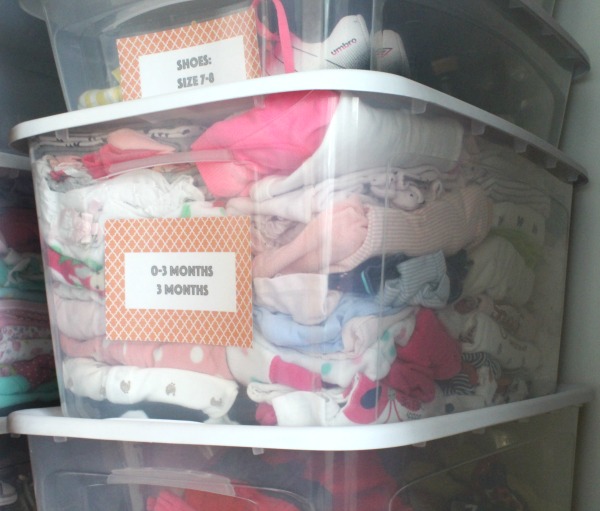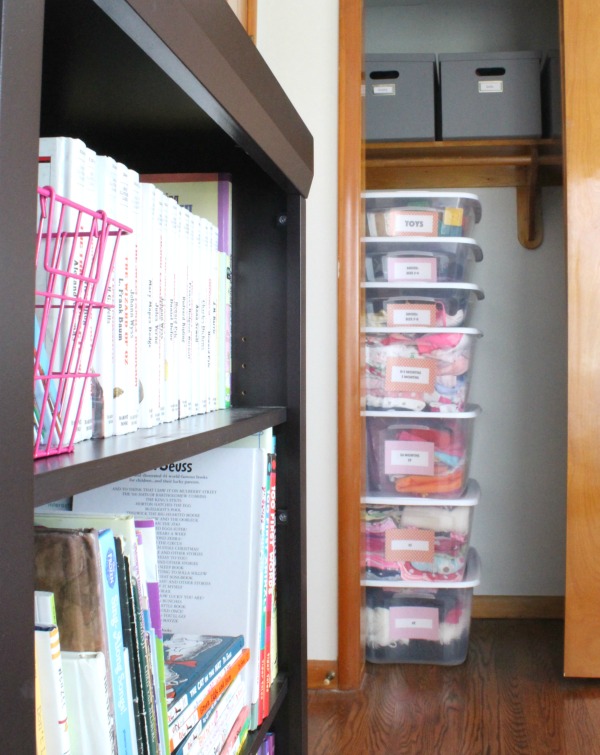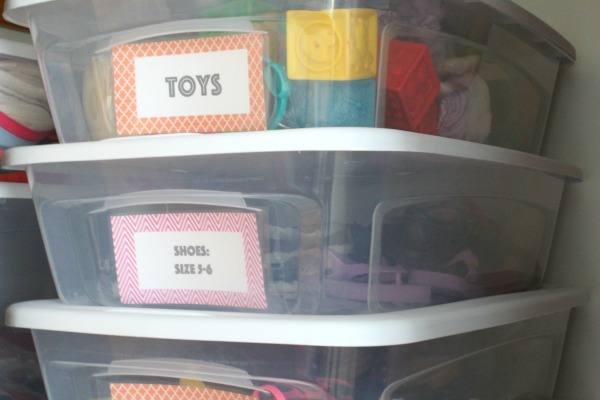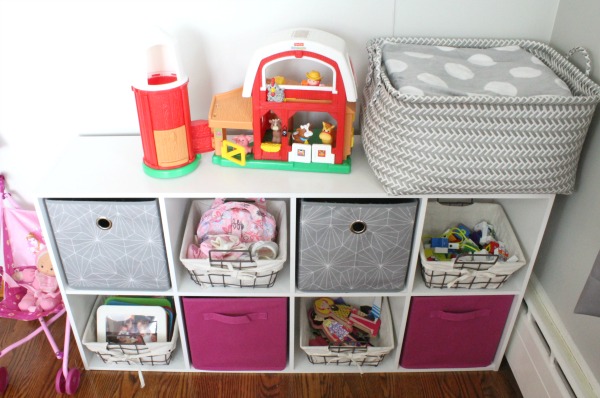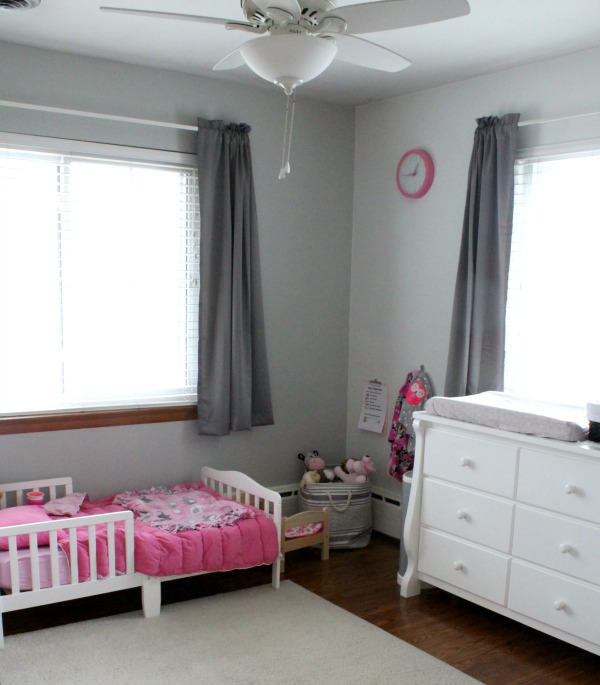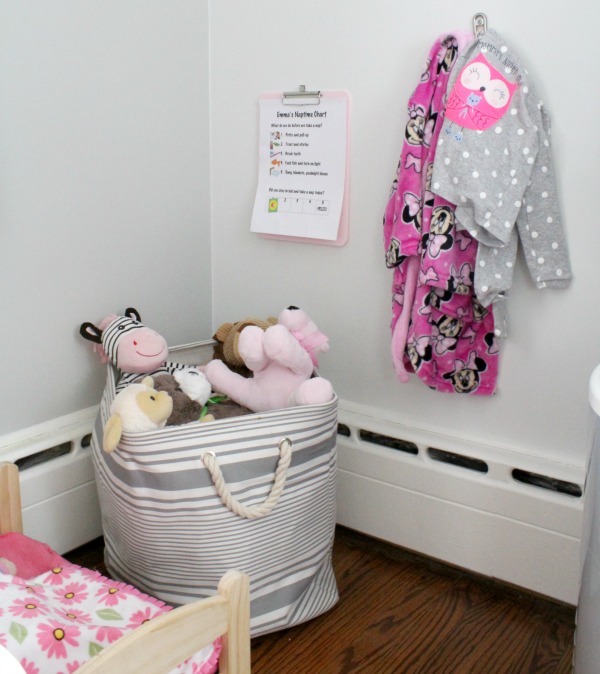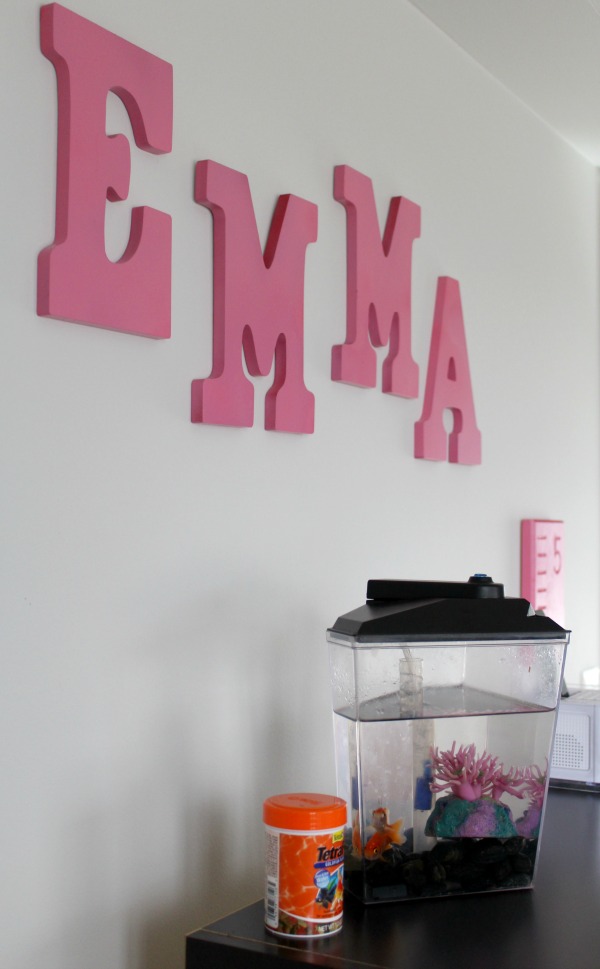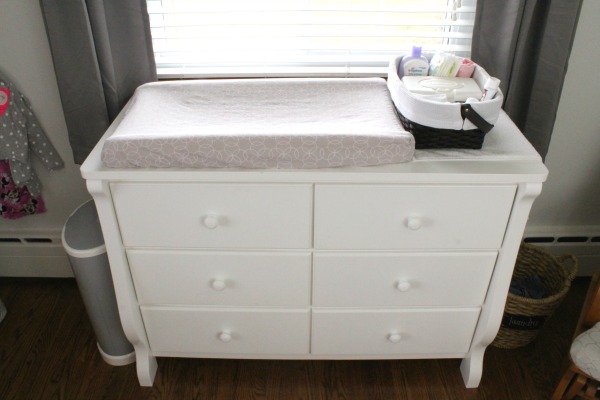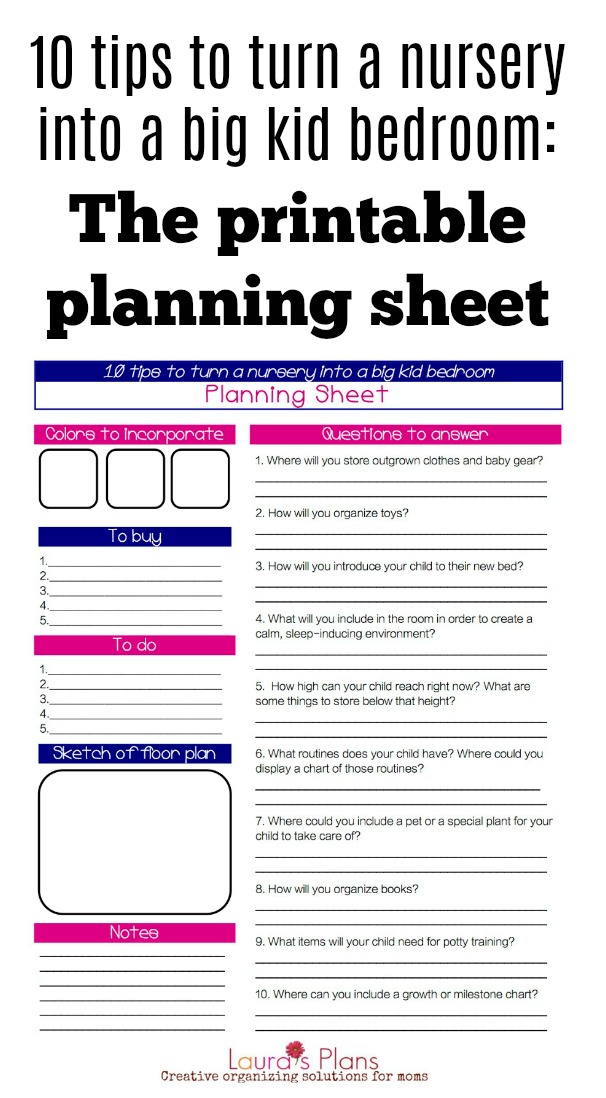"All children, except one, grow up." -J.M. Barrie, Peter Pan
Well, Emma hasn't grown up quite yet, but the time is certainly flying by. I can't believe she's already 2!
And, as a 2 year old, we decided it was time to redesign her bedroom,
transitioning her from a nursery to a big girl bedroom.
Today I wanted to share with you 10 tips that I picked up along the way that will help you if you are also planning a toddler bedroom design. I've also included affiliate links in this article- click here to find out more about those. :)
At the end, you'll find a printable planning worksheet that will help you incorporate some of these tips into your own project. Ready for tip #1? Here we go!
If you've had a baby for any amount of time, you know that the outgrown clothes can pile up quickly and soon get out of control. Switching to a big kid room is the perfect time to make sure you've got a plan to deal with the outgrown clothes storage issue.
Well, Emma hasn't grown up quite yet, but the time is certainly flying by. I can't believe she's already 2!
And, as a 2 year old, we decided it was time to redesign her bedroom,
transitioning her from a nursery to a big girl bedroom.
Today I wanted to share with you 10 tips that I picked up along the way that will help you if you are also planning a toddler bedroom design. I've also included affiliate links in this article- click here to find out more about those. :)
At the end, you'll find a printable planning worksheet that will help you incorporate some of these tips into your own project. Ready for tip #1? Here we go!
1. Plan for clothes and baby gear storage
If you've had a baby for any amount of time, you know that the outgrown clothes can pile up quickly and soon get out of control. Switching to a big kid room is the perfect time to make sure you've got a plan to deal with the outgrown clothes storage issue.
I decided to use big, clear plastic bins to store outgrown clothes, toys, and shoes in half of Emma's bedroom closet.
I also use lidded boxes (I found these at Target) to store baby gear such as baby carriers, carseat covers, bottles, bibs, and pumping essentials. 

On the other side of the closet, I use a three-drawer hamper (similar to this one) to temporarily store items that are too small, too big, or need to be donated. 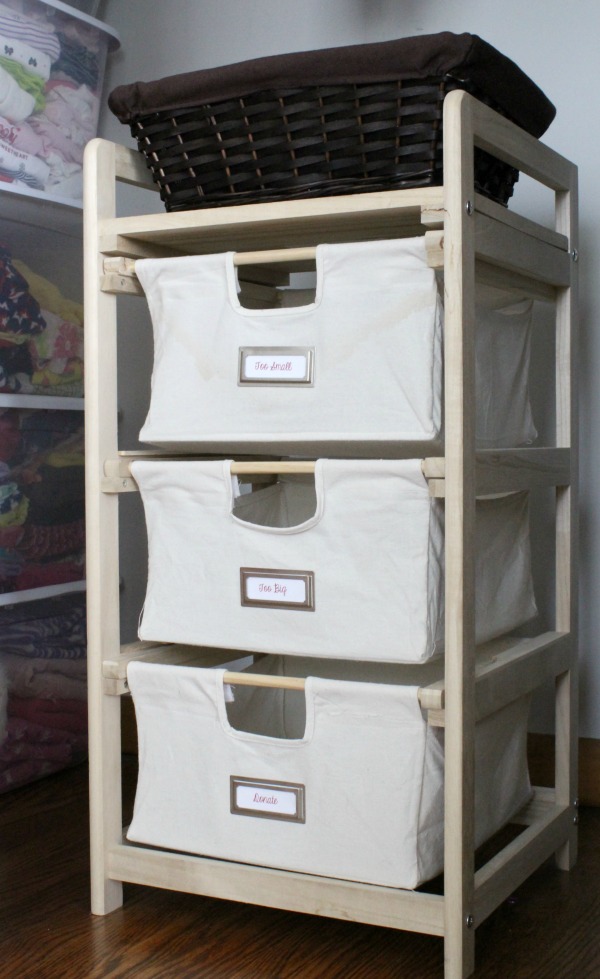

That way, I don't have to be constantly getting out the larger plastic bins every time I receive a hand-me-down or realize that an item has been outgrown.
2. Plan for toy storage
We decided to use a simple cube storage shelf for toys. I love using baskets and bins because they make it easy for my 2 year old to clean up herself. It also keeps sets of toys all together. In this photo you can see the basket where I keep Emma's foam picture frames. 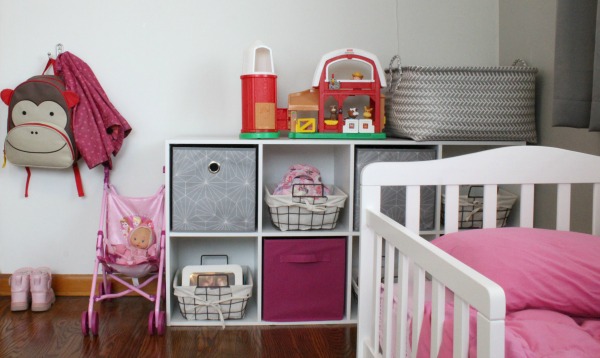

We put the storage shelf on its side so that our daughter could reach everything by herself. A few bigger toys fit on the top, along with this basket, which we use to store extra blankets.
3. Get your child excited about a big kid bed
We made a really big deal about Emma getting her own big girl bed. We bought her a new book about sleeping in her own bed and a new bedding set. Then we let her help us put the bed together in the living room and put the blankets and pillow on it. (We even got her a new "toddler pillow" that's just her size.) 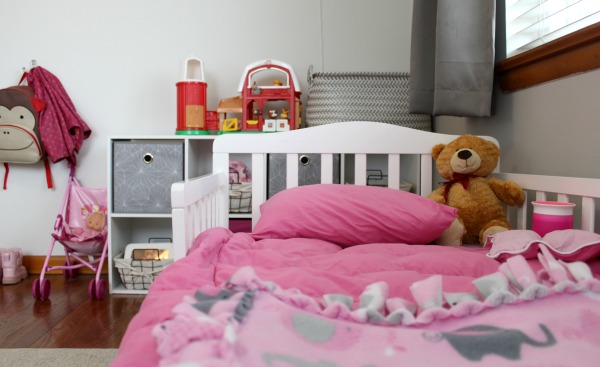

My parents were visiting at the time, and we all took turns lying on the bed in the living room and pretending to go to sleep. Emma thought she was the luckiest girl in the world when we told her that she would be the one to get to sleep in it that night!
4. Don't forget about the primary purpose of the room
At the end of the day (and quite possibly in the middle of the afternoon as well) this room will be primarily used as a place for your munchkin to sleep. Think about adding some calming, sleep-inducing elements to your design plan. For us, that meant room-darkening curtains. When we close the blinds and pull the curtains closed, Emma knows it's soon going to be time to go to bed.
You might choose to make a special spot for a noise machine, a nightlight, or a special nighttime toy. Emma doesn't like to sleep without her babydoll, so we made sure the baby's bed was right next to the big bed.
5. Store most things within your toddler's reach
One of our goals with this room design was to encourage Emma to be more independent. One easy way to do that is to store things low enough that your toddler can easily reach them.
We asked Emma to stand next to a wall and reach as high as she could. Then we installed 2 hooks where we knew that she would be able to reach them. The first one is for her to hang her coat and her backpack. (She carries her own pull-ups, water bottle and snacks in the backpack.) The second hook is for her robe and pajamas. 

In addition, we put all of Emma's clothes, including her shoes and socks, in the bottom 4 drawers of the dresser so that she can easily reach them and get dressed all by herself.
6. Make a special spot for routine and sticker charts
Another way to help toddlers become more independent is to make routine and sticker charts for their daily activities.
We're currently working on our nap time routine and having Emma stay in her bed once it's time to go to sleep. Emma can look at the pictures and tell us the steps for getting ready for bed. I like having the chart displayed this way so that she can go over and look at it whenever she wants to. We also have another chart showing the steps for going potty.
7. Think about including a pet or plant
This is a great way to start to teach your toddler how to be responsible. We won these fish at a carnival, and now it's a part of our nap time/bedtime routine for Emma to feed them. She gets really excited about it, which is adorable. Plus, they're fish, so they're super low-maintenance.
8. Plan for book storage
We have TONS of books. (Here's the list our favorite 100 that we read with Emma when she was one year old.) We knew that a cute little bookshelf just wasn't going to cut it for us. Instead, we bought a full-sized bookshelf right from the beginning.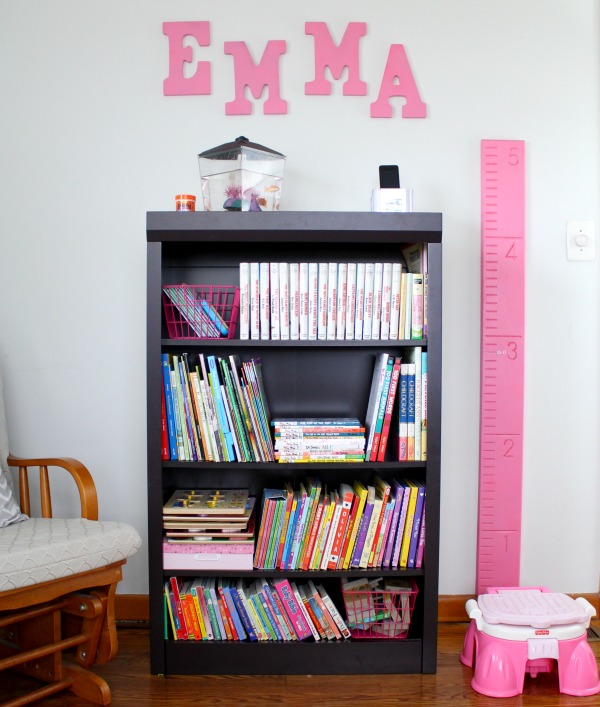 Then I bought a few wire baskets to store all the teeny tiny books that Emma loves so much. This keeps them from constantly falling all over the floor. Game. Changer.
Then I bought a few wire baskets to store all the teeny tiny books that Emma loves so much. This keeps them from constantly falling all over the floor. Game. Changer.
 Then I bought a few wire baskets to store all the teeny tiny books that Emma loves so much. This keeps them from constantly falling all over the floor. Game. Changer.
Then I bought a few wire baskets to store all the teeny tiny books that Emma loves so much. This keeps them from constantly falling all over the floor. Game. Changer.9. Plan for potty training
All kids are different, so keep your child's needs in mind when you're designing his or her big kid bedroom. Emma is very excited about potty training, but still has accidents. Plus, she's still wearing pull-ups during her nap and diapers at night. So we decided to keep the changing pad and diaper caddy on the dresser for now. (See how I organize her diaper caddy here.)
Since we opted for a dresser instead of a changing table in the original nursery, it'll be easy to replace the changing pad with something else when we don't need it anymore.
We also decided to keep a little potty right in Emma's room. She loves being able to make decisions, so we always ask her, "Would you like to use the little potty or the big potty today?"
10. Track your toddler's growth
There's nothing quite like transitioning your toddler into a big kid bedroom to make you realize just how fast they are growing up!
We wanted Emma to know how proud we are of what a wonderful big girl she's growing into. What better way to celebrate that fact than with a growth chart?
Plus, measuring how tall she's getting is is great incentive to eat healthy foods, take naps in a big bed, and go potty. (All things that "big girls" do.) And you'll have a great reminder of just how far your little one has come. :)
Planning Worksheet
If you are planning to transition your child from a baby nursery to a toddler room, download and print this planning worksheet to help you keep track of your ideas and form a plan.
So what do you think? Did I forget any important tips? Be sure to let me know in the comments.
Did you find this article helpful? If you did, I would love if you could pin it and share the love!
PIN IT
Did you find this article helpful? If you did, I would love if you could pin it and share the love!


